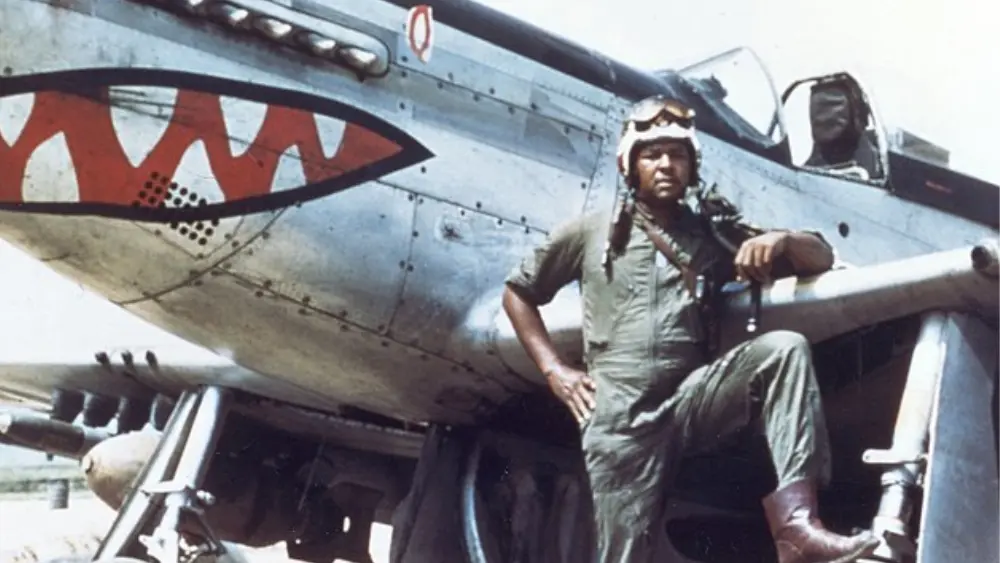Daniel “Chappie” James Jr., born on February 11, 1920, was a pioneering figure in the United States military, breaking barriers as the first African American four-star general. His remarkable career spanned several decades, leaving a lasting impact on the U.S. Air Force and paving the way for future generations of diverse military leaders.
Early Life and Military Aspirations: Nurturing a Passion for Aviation
James’ journey into a groundbreaking military career began in Pensacola, Florida, where he cultivated a deep passion for aviation despite the challenges of racial segregation. Determined to become a pilot, he navigated a path marked by perseverance and resilience. Overcoming societal barriers, James’ pursuit of excellence in aviation became a testament to his indomitable spirit and commitment to breaking through racial barriers in the pursuit of his dreams.
James’ early experiences laid the foundation for a trailblazing career that would see him become the first African American four-star general in the United States Air Force. His story not only highlights personal triumph but also inspires generations to come, showcasing the transformative power of individual determination in the face of adversity.
Daniel James Jr.: Overcoming Racial Barriers in Pursuit of Aviation
Growing up in a time of racial segregation, Daniel James Jr. faced numerous challenges on his path to aviation. However, his unwavering determination and commitment to excellence became the driving force behind a trailblazing military career. Overcoming societal barriers, James embarked on a journey that not only shattered racial norms but also paved the way for future generations of African American aviators and military leaders.
As the first African American four-star general in the United States Air Force, James’s legacy extends beyond his individual accomplishments. His story serves as a symbol of resilience, breaking through racial barriers to achieve success and recognition in a field where diversity was historically limited. James’s pioneering efforts not only propelled his own career but also paved the way for others, leaving a lasting legacy in the history of the U.S. military. His achievements inspired countless individuals to pursue their dreams, regardless of societal limitations.
World War II Service: Fighter Pilot and Decorated Hero
Daniel James Jr.’s World War II service was marked by his role as a fighter pilot with the Tuskegee Airmen, a group of African American military aviators who overcame racial discrimination to serve their country. James’s exceptional skill in the cockpit not only contributed to the success of the Tuskegee Airmen but also garnered him respect and recognition among his peers. As a decorated hero, he received numerous awards and commendations for his bravery and outstanding contributions during the war, establishing a foundation for the remarkable military career that would follow.
James’s service during World War II was not only a testament to his courage but also a significant chapter in the history of African Americans in the U.S. military. The Tuskegee Airmen, including James, played a crucial role in challenging racial stereotypes and proving that African Americans could excel as skilled and heroic aviators. Their collective achievements paved the way for greater opportunities and integration within the military, influencing the trajectory of racial equality in the armed forces.
Daniel James Jr.: Exceptional Skill and Decorated Service
Daniel James Jr.’s exceptional skill and dedication to service during World War II set him apart as a remarkable military aviator. As a fighter pilot with the Tuskegee Airmen, James demonstrated not only his proficiency in the cockpit but also his resilience in the face of racial barriers. His achievements became a testament to the capabilities of African American aviators, challenging discriminatory practices within the military.
James’s decorated service during World War II earned him respect and recognition, not just for his individual achievements but also for his role in breaking down racial barriers in the military. The Tuskegee Airmen, under James’s leadership and alongside his fellow aviators, played a pivotal role in proving that African Americans could excel as skilled and heroic pilots. This chapter in James’s military career laid the groundwork for his future leadership roles and set an inspiring example for generations to come.
Korean and Vietnam Wars: Rising Through the Ranks
In the crucible of the Korean and Vietnam Wars, Daniel James Jr. further solidified his reputation as a military leader of exceptional caliber. His innate leadership abilities and strategic acumen became evident as he navigated the complexities of these conflicts. James’s commitment to excellence and his remarkable leadership qualities propelled him through the ranks, earning him the distinction of becoming the first African American four-star general.
James’s achievements during the Korean and Vietnam Wars were not only a testament to his individual prowess but also marked a significant milestone for racial integration within the U.S. military. As he rose through the ranks, his accomplishments shattered racial barriers and opened doors for future generations of African American military leaders. James’s journey during these wars exemplified not only his commitment to national service but also his pivotal role in advancing diversity and inclusion within the highest echelons of the U.S. armed forces.
Daniel James Jr.: Leadership Excellence and Military Strategy
Daniel James Jr.’s contributions during the Korean and Vietnam Wars showcased not only his exceptional flying skills but also his acumen in military leadership and strategy. Serving in challenging and dynamic wartime environments, James demonstrated an extraordinary ability to navigate complex scenarios. His leadership excellence became evident as he devised and implemented military strategies that contributed to the overall success of U.S. operations in these conflicts. James’s keen understanding of military tactics and his decisive decision-making set him apart as a leader capable of meeting the intricate challenges of warfare head-on.
In addition to his tactical brilliance, James’s leadership during these wars was characterized by a commitment to the well-being and morale of his troops. His strategic approach emphasized not only achieving military objectives but also ensuring the welfare of those under his command. This holistic leadership style endeared him to those he led and contributed to the overall effectiveness of the military units he commanded. James’s legacy in military strategy during these wars remains a testament to his exceptional leadership qualities and his lasting impact on the U.S. Air Force.
Promotion to Four-Star General: Breaking the Color Barrier
Daniel James Jr.’s promotion to the rank of four-star general in 1975 marked a historic and groundbreaking moment in the U.S. military. His elevation to this prestigious rank shattered longstanding racial barriers and stood as a testament to his exceptional skills, leadership, and dedication to service. James’s achievement not only reflected his personal triumph over racial discrimination but also served as an inspiration for future generations of African American military officers, demonstrating that merit and competence could overcome systemic prejudices.
As the first African American to attain the rank of four-star general, James played a pivotal role in opening doors for greater diversity and representation within the highest ranks of the U.S. military. His promotion was a significant step toward breaking down racial barriers in the armed forces, paving the way for a more inclusive and equitable military leadership.
Daniel James Jr.: Breaking Racial Barriers
Daniel James Jr.’s historic promotion to the rank of four-star general in 1975 was a watershed moment that shattered racial barriers in the U.S. military. As the first African American to attain this prestigious rank, James’s accomplishment transcended personal success, symbolizing a significant breakthrough in the struggle for equality and representation within the armed forces. His promotion was not only a recognition of his exceptional leadership and military acumen but also a groundbreaking step toward dismantling systemic racial discrimination that had persisted for decades.
James’s achievement had a profound impact on the trajectory of diversity and inclusion in the U.S. military. Breaking through the racial barriers that had limited the advancement of African American officers, James paved the way for greater representation and opportunities for minorities within the highest echelons of military leadership. His promotion served as an inspiration for future generations, demonstrating that merit and competence should be the guiding principles for advancement in the armed forces, irrespective of one’s racial background. Daniel James Jr.’s legacy continues to resonate as a beacon of progress and a reminder of the ongoing commitment to fostering diversity and inclusivity in the U.S. military.

Legacy and Impact: Inspiring Generations of Military Leaders
Daniel James Jr.’s legacy is etched in the annals of American military history as a trailblazer who not only achieved remarkable milestones but also inspired future generations of military leaders. His historic promotion to the rank of four-star general in 1975 shattered racial barriers, demonstrating that merit, skill, and dedication were the true measures of leadership, irrespective of one’s racial background. James’s journey from overcoming racial segregation to becoming the first African American four-star general resonates as a powerful narrative of resilience, courage, and a commitment to excellence.
Beyond his personal achievements, James made a lasting impact on the culture of the U.S. Air Force. His legacy serves as a constant reminder of the importance of diversity and inclusivity in the military. James’s pioneering spirit has inspired countless individuals to pursue careers in the armed forces, fostering a culture that values talent, leadership, and meritocracy. As a beacon of progress, Daniel James Jr. continues to stand as an enduring symbol, inspiring generations of military leaders to break barriers, embrace diversity, and strive for excellence in service to their country.








